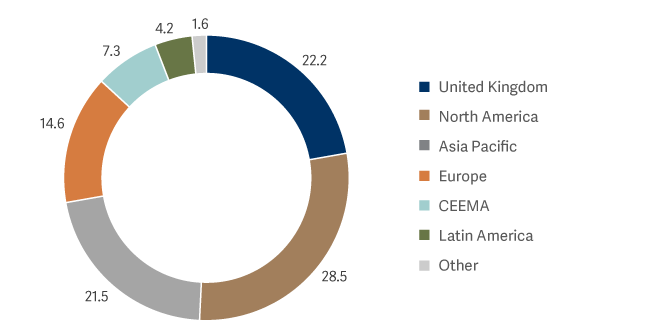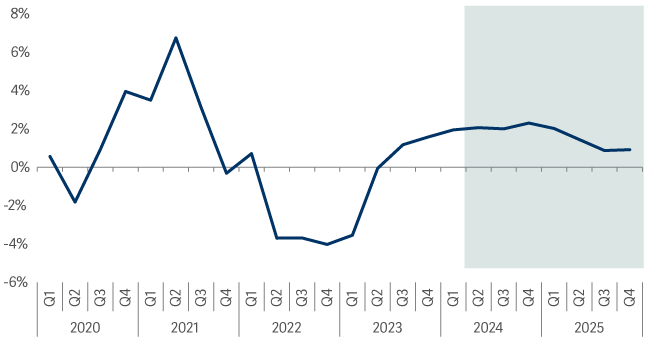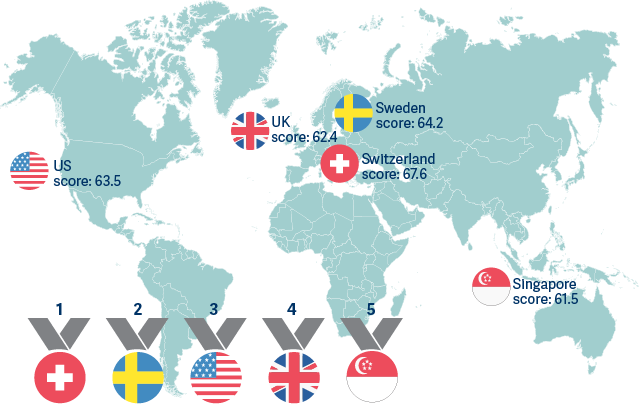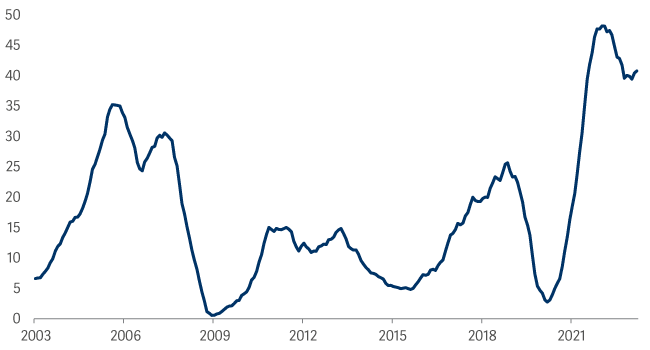Do companies listed in the UK deserve to trade on a historically wide discount to their global peers? Five charts help to explain why investors who ignore the UK risk missing out on profits that are staring them right in the face…
FOR PROFESSIONAL INVESTORS AND/OR QUALIFIED INVESTORS AND/OR FINANCIAL INTERMEDIARIES ONLY. NOT FOR USE WITH OR BY PRIVATE INVESTORS. CAPITAL AT RISK. All financial investments involve taking risk and the value of your investment may go down as well as up. This means your investment is not guaranteed and you may not get back as much as you put in. Any income from the investment is also likely to vary and cannot be guaranteed.
1. The valuations of UK stocks are compelling
The UK is one of the most undervalued major stockmarkets in the world today. Companies listed in the UK are cheap in absolute terms, relative to their own history and compared to other developed markets.
Is the extremity of the discount on which it currently trades relative to its international peers justified? And will it persist? We believe the answer to both questions is a clear ‘no’.
World equity markets valuations versus history

Source: Goldman Sachs as at 31 March 2024
The discount on which UK plc trades today is, in part, a product of a narrative of decline surrounding the country as a whole. Whether you agree with that narrative or not, perceptions matter: in the short term, it is sentiment rather than earnings that drives the market.
Ultimately, however, it will be corporate fundamentals – such as dividends and profits – that will determine long-term returns. And here the story about the UK is far brighter than the headlines might lead you to believe…
2. Beyond borders: the FTSE is a globally-exposed index
One of the legacies of the UK’s history as a trading nation is that its stockmarket is dominated by companies who find their customers and sales overseas: global banks, energy companies, commodity producers and pharmaceutical giants.
FTSE 100 revenue by region

Source: Factset as at 29 March 2024
Irrespective of your view of the prospects for the UK economy, the fact of the matter is that around 77% of the FTSE 100’s aggregate earnings are actually derived overseas.
So, if you want to gain exposure to the global economy without overpaying, it’s worth taking a look at UK companies.
3. Positive ‘real’ wage growth and UK consumer demand are transforming the outlook for the UK economy
In recent years, the perception among many overseas investors – who will ultimately determine when UK stocks are re-rated – is that the UK economy was not in good shape. Towards the end of last year, however, revisions to official data began to paint a more encouraging picture. Rather than being a laggard, the UK’s economic performance since the pandemic put it in the middle of the pack relative to other G7 economies.
What else might encourage perceptions to change? We believe it will be the strength of UK consumers, whose collective spending underpins some 60% of UK economic activity. They, in turn, are being supported by:
- Wages growing more quickly than inflation1.
- Recent cuts to National Insurance, which will be worth an average of £900 to some 27 million workers.2
- The National Living Wage, which has increased by almost 10%.3
- An 8.5% uplift to the state pension.4
As ‘real’ wages rise more quickly than inflation, consumer confidence is increasing, returning to levels not seen since the UK emerged from the first lockdown in 20215.
Indeed, the head of retailer Next believes UK consumer confidence is the strongest he has seen in seven years, as pay rises encourage shoppers to spend6.
Real wage growth (% change on YoY)

Source: Lazarus Economics & Strategy/ONS as at 31 March 2024
Perceptions matter. And, thanks to rising real wages and consumer demand, 2024 might be the year in which perceptions of the UK economy begin to change.
4. The UK is home to a surprising number of world-leading, innovative companies
Like all clichés, the idea that the UK stockmarket is dominated by dirty, extractive ‘old economy’ industries contains a grain of truth: invest in a FTSE100 tracker and you’ll own your share of miners, oil producers and industrial companies.
But that’s not the whole story: over the past decade, a number of world-leading companies in the UK have invested in technology to reinvent themselves and neutralise the threat from disruptors. So look more closely and what may initially seem like ‘old economy’ companies may actually be something more intriguing.

Source: WIPO Global Innovation Index 2023
Take Next, for example. It appears to be valued as if it were just another high-street shop selling clothing and homeware. But, in reality, it has become a technology-driven retail platform with more growth potential than you might realise: its ‘Total Platform’ provides a complete e-commerce solution for other brands, from marketing, online sales through to warehousing, distribution and contact centres.
And it isn’t just Next. Look through the portfolio of our UK funds and you’ll find companies such as:
- Oxford Instruments: sells into high-growth, high-tech areas such as compound semiconductors, quantum computing and life science,
- Pearson: formerly a publisher of weighty academic textbooks, it has become an education company built for the digital age;
- Smiths Group: still valued as a stodgy industrial conglomerate, it is a pioneer in providing engineering solutions to growth markets including the energy transition, data networks and satellite technology.
5. M&A and share buybacks will eventually close the ‘UK discount’
Today, valuation multiples in the UK are depressed despite the fact that the earnings of many UK companies are rising. So there’s a disconnection. In the short term, negative sentiment continues to deter capital inflows from global investors. At some point, however, that will change – valuations will matter again. In the meantime, two types of buyer are exploiting the discount on which UK equities trade:
- Corporate buyers – using M&A to snap up UK-listed companies (such as DS Smith).
- UK plc – companies buying back and retiring their own shares (such as Natwest and Barclays).
UK plc is buying its own shares (rolling annual £bn)

Source: Haver Analytics and Goldman Sachs Research as at 29 February 2024
We believe there is more of this buying to come. Today, investors can buy UK companies who are growing their earnings (and often raising their dividends) at a significant discount to their global peers and simply wait for the market to do its work.
Eventually, the connection between fundamentals and share prices will be re-established: the UK discount won’t last forever.
1FT, 16 April 2024 “UK wage growth beats expectations as unemployment ticks up”
2FT, 9 March 2024 “Jeremy Hunt unveils £10bn national insurance cut in pre-election Budget”
3FT, 19 March 2024 “Jump in UK minimum wage keeps Bank of England on alert”
4FT Adviser, 22 November 2023 “State pension to rise 8.5% as triple lock confirmed”.
5Deloitte 19 April 2024 Consumer confidence reaches new two-year high amidst improving personal finances
6FT 21 March 2024 UK consumer confidence at its best in seven years, says head of Next


